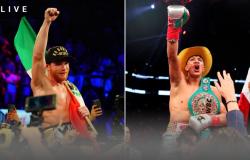NEW YORK — Donald Trump repeatedly sought to block potentially damaging media reports that might hurt his 2016 presidential campaign but did not seem worried about how his family would feel about them, the former publisher of the National Enquirer testified Thursday.
David Pecker, the former media executive, said at Trump’s criminal trial on 34 charges of falsifying business records that Trump did not appear concerned about how a story of his alleged affair years earlier with Playboy model Karen McDougal would impact his family, including his wife, Melania.
“It wasn’t ‘What would Melania say or Ivanka?’ Pecker testified at the Manhattan courthouse, referencing Trump’s spouse and his eldest daughter. “It was basically [about] what the impact would be to the campaign and the election.”
The trial is the first faced by a former US president.
Manhattan District Attorney Alvin Bragg’s case against Trump, the likely Republican nominee in the presidential election in November, is centered on an attempt to cover up the nature of a $130,000 payment to adult-film actress Stormy Daniels in 2016 to keep her quiet about a decade – old alleged sexual encounter with Trump. The payment was made before the 2016 presidential election.
Trump’s former lawyer Michael Cohen fronted that payment, and when Trump repaid him, he purposely misclassified the disbursements as routine legal costs instead of what they were: a shifting of funds that was ultimately designed to buy her silence about a tawdry encounter that could have derailed Trump’s campaign, according to Bragg.
Prosecutors say that Trump had a legal obligation to disclose the Daniels payment under campaign finance laws and that failing to do so amounted to election interference. Trump lawyers have said that he was trying to save his family from public embarrassment and that he has denied any involvement with Daniels. They have presented the matter as an extortion attempt by Daniels.
Pecker had a number of discussions with Cohen, acting as a conduit to Trump, and he also spoke directly to Trump about the McDougal story and attempts to suppress it. Pecker told jurors that he believed McDougal was telling the truth about her 2005 intimate relationship with Trump — which overlapped with Melania’s pregnancy — and that he purchased the rights to it as a way to protect his friend.
Melania Trump was not part of the conversations about the need to act any issues involving McDougal and later Daniels, the witness said.
“His family was never mentioned, and the conversation I had directly with Mr. Trump, his family wasn’t mentioned, so I made the assumption the [main] concern was the campaign,” said Pecker, the former CEO of American Media Inc., the company that once ran the Enquirer and other celebrity gossip publications.
Pecker recounted several conversations with Trump about the McDougal situation. In Pecker’s recounting for the jury, he did not mention any type of denial by his longtime friend. On Trump’s behalf, AMI paid McDougal $150,000, Pecker said, because “I believed the story was true” and “it would have been very embarrassing for himself and also his campaign.”
“What should I do?” Pecker testified Trump had asked him.
Pecker said he told Trump he should “buy the story and take it off the market,” but AMI ended up doing it for him, initially expecting to get reimbursed. As the reimbursement was set to happen, Pecker told jurors he withdrew the arrangement to transfer rights of the story to Trump. It was not clear from his testimony why he reversed his plan.
According to the testimony, Trump had several conversations with Pecker about the McDougal agreement. He continued to keep track of whether McDougal was abiding by her confidentiality contract even from the White House. In July 2017, he invited Pecker to the White House for dinner to thank him for his help with the McDougal situation and the purchase of a Trump Tower doorman’s false story of Trump having a child outside his marriage.
By that point, the hush money payment to McDougal had been reported by the Wall Street Journal, and Trump asked for an update. “How’s Karen doing?” Trump asked Pecker as they walked across the White House grounds, according to Pecker’s testimony. “I said, ‘She’s doing well,'” Pecker recalled. “ ‘She’s quiet. She’s doing good.’”
And when McDougal started doing press interviews, Trump called Pecker to ask why and gave him an earful when Pecker explained that she had been released from that condition of her AMI agreement. Trump hung up without saying goodbye.
Pecker learned of the Daniels allegation after the release of a 2005 “Access Hollywood” clip that featured Trump bragging about his ability to grab women’s genitals without asking permission. Pecker told one of his editors to pass the tip about Daniels along to Cohen because he “thought it could be very damaging … I thought Michael Cohen and Donald Trump should buy it.”
The crux of the district attorney’s case is that Trump’s aim was to protect his run for president and that was his motive when he allegedly concealed the payment to Daniels. Prosecutors have used the McDougal story to show a pattern of similar strategies by Trump and his advisers to keep quiet disparaging stories about him.
Pecker testified earlier in the week that in 2015, he reached an agreement with Trump and Cohen to tip them off to any salacious stories that people may have been trying to shop around at publications like his that pay sources for information. That agreement included a promise to promote negative pieces about Trump opponents such as Sen. Ted Cruz (R-Tex.) and former secretary of state Hillary Clinton.
In particular, women try to sell stories about male politicians, Pecker testified, illustrating for the jury the business of running a checkout-aisle tabloid that routinely paid for stories it had no intention of publishing just to take them from the competition. Pecker said the “catch and kill” method was a common event at the National Enquirer.
It was murky to navigate, Pecker testified, because he knew that buying stories like that one to keep them out of a political campaign was a potential legal problem. For that reason, AMI drafted a confidential agreement with McDougal that also promised her professional opportunities, such as publishing articles and being featured on the cover of fitness publications.
Pecker said he once had a similar deal with another celebrity who ran for office — Arnold Schwarzenegger — and in that experience he learned that such financial exchanges during a campaign could run afoul of election laws.
“Did you come to appreciate the legalities surrounding such an arrangement with a political candidate?” Assistant District Attorney Joshua Steinglass asked Pecker in New York Supreme Court on Thursday.
“Yes,” Pecker said. “That was the first time I ever came across a political contribution and what a violation it was.”
Trump and Pecker had been friends since the late 1980s, according to Pecker, who said on the witness stand that he still considered Trump a friend even though they no longer speak to each other. Pecker also said he has worked with Trump as far back as 1998, even before he took over the tabloid publication. He tipped off Trump when the Enquirer was working on a negative story about Trump’s second wife, Marla Maples.
The case against Trump is supported by the testimony of co-conspirators, including Pecker and Cohen. A former editor at the National Enquirer, Dylan Howard, was also part of the alleged scheme. Prosecutors said he is unable to testify because he has a medical issue and is in Australia.
It’s been widely reported that Pecker received immunity from federal prosecutors for his information about withholding negative Trump stories, but Pecker said Thursday that he was testifying under an immunity agreement with Bragg’s office.
Daniels and McDougal are also likely to be witnesses in the case.
On cross-examination, Trump’s lawyers had Pecker acknowledge that he had been buying, and sometimes squashing, stories about high-profile celebrities for years, long before the 2016 election. Pecker said that he used photos of golfer Tiger Woods having an extramarital affair to persuade him to give an interview and cover photo for a fitness magazine published by Pecker’s media company, and that he helped suppress negative stories about actor Mark Wahlberg and politician Rahm Emanuel.
The defense seemed to be laying the groundwork that Pecker was merely conducting business as usual when he paid for and killed two negative stories about Trump, as he had done before with Schwarzenegger, rather than acting to influence an election.






